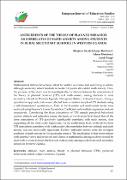| dc.contributor.author | Batiibwe, Marjorie Sarah Kabuye | |
| dc.contributor.author | Mwebesa, Edson | |
| dc.contributor.author | Tengi, Jacob | |
| dc.date.accessioned | 2020-03-20T08:51:03Z | |
| dc.date.available | 2020-03-20T08:51:03Z | |
| dc.date.issued | 2020 | |
| dc.identifier.citation | Batiibwe, M. S. K., Mwebesa, E., & Tengi, J. (2020). Antecedents of the theory of planned behaviour as correlates of math anxiety among students in rural Secondary Schools in Western Uganda. European Journal of Education Studies, 7(1), 207–233. https://doi.org/10.5281/zenodo.3706992 | en_US |
| dc.identifier.issn | 25011111 | |
| dc.identifier.uri | http://dir.muni.ac.ug/xmlui/handle/20.500.12260/340 | |
| dc.description.abstract | Mathematical abilities have been linked to positive outcomes and well-being in adults, although secondary school students in Western Uganda still exhibit math anxiety. Thus, the purpose of the study was to investigate the correlation between the antecedents of the theory of planned behavior (TPB) and math anxiety among students in rural secondary schools in Western Uganda, Ntungamo District, Ruhaama County. Using a quantitative approach, data were collected from a random sample of 578 students using a self-administered questionnaire. Data at the bivariate and multivariate levels were analyzed using Pearson’s Linear Correlation Coefficient and multiple regression analysis respectively. Considering the three antecedents of TPB namely perceived behavioral control, attitude and subjective norms, the study at the bivariate level found that all the three antecedents of TPB positively significantly correlated with math anxiety, thus supporting all the three study hypotheses. At the multivariate level, while all the three TPB antecedents correlated with math anxiety, the correlation between attitude and math anxiety was not statistically significant. Further, subjective norms were the strongest predictor of math anxiety in this particular context. The implication is that interventions with parental views and perceived usefulness of mathematics among students should be dealt with in order to lower the levels of math anxiety among students in rural secondary schools in Western Uganda. | en_US |
| dc.language.iso | en | en_US |
| dc.publisher | European Journal of Education Studies | en_US |
| dc.relation.ispartofseries | Vol.7;No.1 | |
| dc.subject | Attitude | en_US |
| dc.subject | Math anxiety | en_US |
| dc.subject | Theory of planned behavior (TPB) | en_US |
| dc.subject | Perceived behavioral control | en_US |
| dc.subject | Subjective norms | en_US |
| dc.subject | Uganda | en_US |
| dc.title | Antecedents of the theory of planned behaviour as correlates of math anxiety among students in rural Secondary Schools in Western Uganda. | en_US |
| dc.type | Article | en_US |

